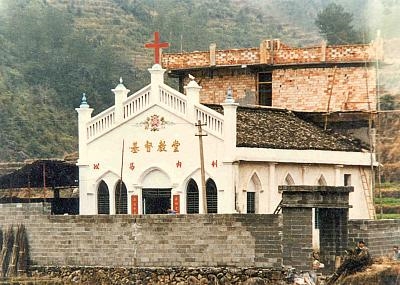
The Chinese Bishop of Wenzhou, Peter Shao Zhumin, has resurfaced in a Beijing hospital reportedly to undergo ear surgery, after he was taken away from his diocese by security officials in April.
According to the Catholic news site UCAN the bishop re-appeared via the social media app WeChat, through which he urged people not to visit him but to keep him in their prayers. It is unclear if he is still under state control.
An earlier photo of the church leader dressed in pyjamas and sitting on a bed in a hospital setting was widely shared on social media from 8 September.
Bishop Shao was appointed in September 2016 by the Vatican as bishop in the eastern coastal city of Wenzhou, in Zhejiang province, which has a large Christian community. UCAN reports that since his appointment he has been detained four times; it is thought he is being pressured to join the Chinese Catholic Patriotic Association (CPA), which wants independence from the Vatican for the Church in China.
UCAN reports that “if Bishop Shao was to join the CPA, he runs the risk of cutting himself off from 80,000 Catholics in the underground community of Wenzhou. The diocese has 50,000 Catholics in the open church community”.
On 28 June World Watch Monitor reported that the German ambassador to China, Michael Clauss, had made an official request that the Beijing government release the bishop. The Vatican had also expressed its concern.
Clauss also criticised China’s proposed amendments to its rules regulating religious affairs, saying: “I welcome China’s declared intention to achieve progress with regard to the Catholic Church. However, despite progress in this direction, we also see setbacks in guaranteeing religious freedom. One case of growing concern is the treatment of Bishop Shao Zhumin by the authorities”.
On 8 September, the same day Bishop Shao re-appeared, the new set of rules were adopted and will come into force on 1 February 2018. The new rules include guidelines on religious education, the types of religious organisations that can exist, where they can exist and the activities they can organise.
Some have suggested the regulations are mainly focused on curbing the rise of Islamic extremism and will not greatly affect Christians. Others have said local authorities are typically reluctant to enforce regulations on churches because of fears of creating conflict and instability.
But others have said they have seen some tightening of restrictions, particularly related to student and youth work, and that some local authorities hand out punishments to avoid being criticised by their superiors.
Over the summer, children were banned from attending Christian camps in several provinces, while notices were issued in others banning all school children, and their teachers, from going to church.